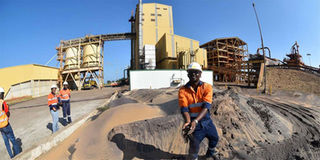Kwale titanium sales rise to Sh7bn in second quarter

A worker at a Base Titanium Mining site in Kwale. PHOTO | KEVIN ODIT | NMG
Australian mining firm Base Resources recorded a 26.1 percent jump in the value of titanium exports from its Kwale mine to Sh7 billion in the quarter ended June, helped by higher prices of the commodity in the international markets.
Sales in the same period last year stood at Sh5.5 billion, with the higher selling prices more than compensating for reduced production and shipments.
The improved sales will result in higher earnings for the government which is paid royalties at the rate of 2.5 percent of the export values.
The volume of exports of the minerals, including zircon, rutile and Ilmenite, dropped 1.5 percent to 139,592 tonnes from 141,812 tonnes after production declined 20 percent to 118,787 tonnes.
The company says production and sales of the products do not always track each other in any given quarter, with some minerals allowed to accumulate before being exported.
In the review period, production was down because output was interrupted for two weeks as the company shifted its operations to the South Dune after exhausting resources in the Central Dune where it started mining.
The multinational says it benefitted from higher prices of the commodities, a trend that is expected to hold in the short term.
“As expected, constraints on the global supply of sulphate ilmenite and high-grade chloride feedstocks (including rutile) have continued to have an impact on the market and supported further positive price momentum,” the multinational said in a trading update.
“Demand for Base Resources ilmenite from existing customers remains greater than the company’s ability to supply and enquiries are regularly being received from potential new customers globally.”
Base Resources says it realised average revenue per tonne of sales of $482 (Sh50,000) in the review period compared to $376 (Sh39,000) the year before, representing an increase of 28.1 percent.
The shift to the South Dune will see the company access another resource estimate of 114 million tonnes.




